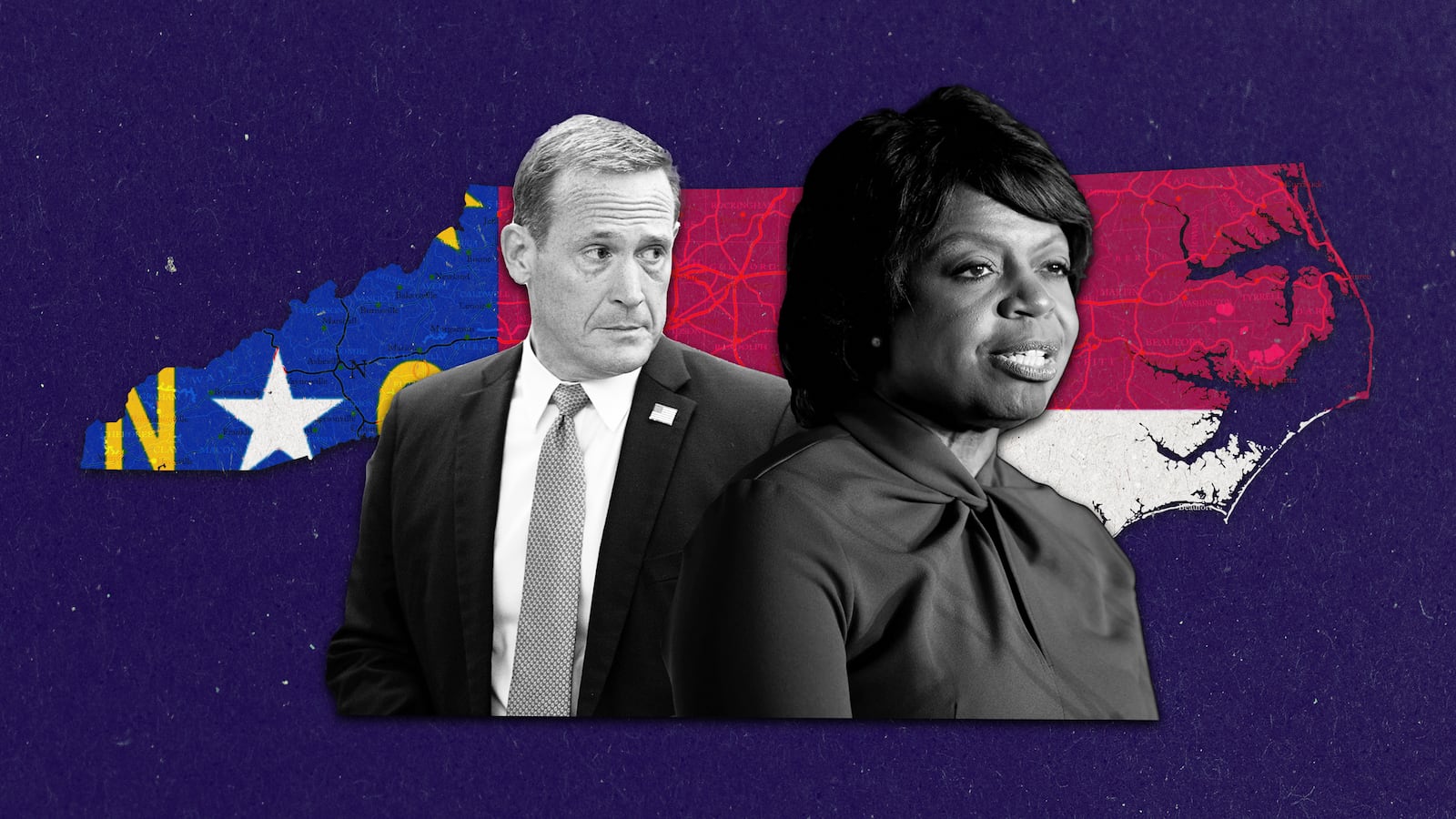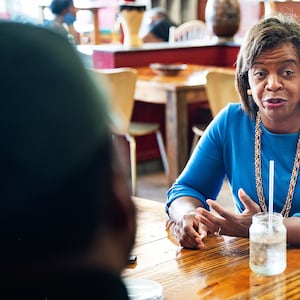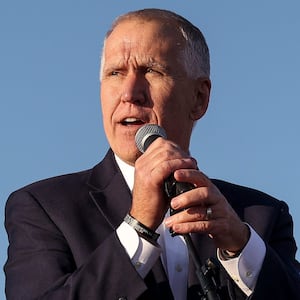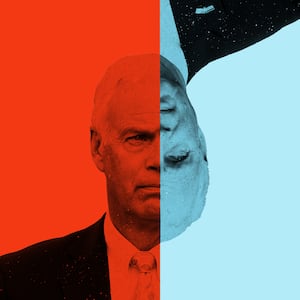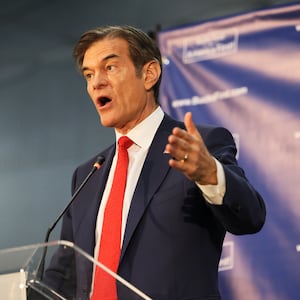It isn’t Pennsylvania, where the nation’s most prominent TV doctor is losing daily Twitter battles—and in the polls—to a Democratic Senate candidate permanently clad in a hoodie. And it isn’t Wisconsin, where voters may finally have had enough of a hard-right Republican senator spouting conspiracy theories.
It’s North Carolina, where Democrats have one of their very best chances to flip a GOP-held Senate seat—even if the party’s biggest donors and outside groups haven’t yet acted like it.
Part of that may be the candidates. The Democratic nominee, former state Chief Justice Cheri Beasley, has quietly gone about convincing voters in this battleground state that she is the right person to send to the Senate. And the Republican candidate, Rep. Ted Budd, is—by comparison to the other GOP Senate candidates this cycle—a generic Republican and a largely unknown quantity to the state’s voters.
Even without the attention and headlines, however, North Carolina could very well decide control of the 50-50 Senate.
“Every cycle, there’s a big Senate race that is a sleeper. There’s no question that the North Carolina race is the sleeper of this cycle,” said Morgan Jackson, a longtime North Carolina Democratic strategist.
After all, the perennial battleground is one of the most sharply divided states in the country, and elections there usually are decided by a few percentage points. What’s more, this year, there’s no incumbent on the ballot, thanks to the retirement of the current GOP senator, Richard Burr.
Budd has run a remarkably low-key campaign since winning a contentious primary in June—so low-key in fact that he’s sparked grumbling in GOP circles that he’s trying to coast to a Senate seat.
It may not have been a bad strategy. At least initially.
For most of the midterm cycle, Democrats have faced a daunting election environment, thanks to President Joe Biden’s low approval ratings and inflation. As Democrats fight to win six seats in battlegrounds that Biden won in 2020, North Carolina, which Donald Trump carried in 2020, could have been seen as a relatively comfortable GOP hold in 2022.
But a suddenly improving environment for Democrats, bolstered by improving economic news, the Supreme Court’s decision on abortion, and a string of Biden wins, has given Democrats hope that they can win in North Carolina. And the lack of early attention on the race, ironically, may have boosted Beasley.
With the spotlight elsewhere, she’s run a state-centered campaign that has been less drowned out by national noise. Democrats believe the proof is in the pudding: Public polls of the race have shown a tight contest, with Beasley and Budd each leading in different surveys.
“The sleepiness of the race has accrued to Cheri Beasley’s benefit,” said Jackson. “It’s allowed her to tell her story, not be nationalized.”
With roughly eight weeks to go until Election Day, however, the race will need to get noisier for Beasley to truly make North Carolina a top-tier Senate battleground.
Namely, Democrats there believe outside groups have to invest more cash, particularly for TV ads. Beasley herself has raised an impressive $16 million. But while the official Democratic Senatorial Campaign Committee has funded voter registration and field operations in North Carolina, it has not spent a dime on TV ads to support her. David Bergstein, a spokesperson for the DSCC, did not say when the group might invest more, but called the race “highly competitive” thanks to Beasley’s “strong campaign.”
Beasley’s biggest backer has been Senate Majority PAC, the outside group aligned with Majority Leader Chuck Schumer (D-NY), which has spent a healthy $3.5 million in air cover for her.
But their two GOP counterparts—the National Republican Senatorial Committee and Senate Leadership Fund—are gearing up for an asymmetric ad blitz, having reserved nearly $28 million in TV ads through November to attack Beasley.
Douglas Wilson, a Democratic strategist in North Carolina, said Beasley can win, but needs more resources from the national level.
“They need to do it soon… whatever they’re going to do, they have to do it now,” he said.
“There’s something going on in North Carolina, that we are on the precipice of flipping, we just need an extra nudge,” Wilson added.
Whether or not North Carolina Democrats get that nudge could have enormous implications for the party’s agenda and the Biden presidency. A Democratic flip of the state could provide decisive insurance for a Democratic majority in the Senate—and break a long-running cold streak in a battleground state that has demoralized the party for years.
Dory MacMillan, a spokesperson for Beasley, said her “savvy campaign” has made North Carolina “a top pick-up opportunity and [Beasley] continues to see momentum as Congressman Budd’s campaign is flailing and national Republicans are forced to come bail him out.”
At the very least, Republicans are gearing up for the race to be more competitive than initially expected.
It’s hard to blame Budd’s camp for “sitting there thinking they had a chance to win in double digits,” said a Republican strategist who has worked on Senate campaigns in the state. “It’s definitely narrowed. At the end of the day, I’d still bet money that North Carolina ends up going for Budd, but it’ll be by a tighter margin than we would have expected pre-Dobbs.”
If Democrats invest more in the race, the GOP strategist said, Budd—whose performance he called “robotic”—is going to need to “step up” his game with additional appearances and more aggressive messaging against Beasley.
Still, what’s hanging over national Democrats’ apparent reluctance to pour cash into North Carolina’s Senate contest are their pricey, and painful, losses there in years past.
The state’s demographics—a booming suburban population coupled with a strong Black electorate—have convinced Democrats, election after election, that this year is the one they finally win a big contest in the state.
But aside from Roy Cooper’s back-to-back wins for governor in 2016 and 2020, North Carolina has been more white whale than electoral silver bullet. No Democrat has won a statewide race for federal office there since 2008, when both Barack Obama and former Sen. Kay Hagan carried the state.
They’ve spent heavily trying to recreate the magic. In 2020, Cal Cunningham, Democrats’ heralded recruit for U.S. Senate who got well over $110 million in outside investment, collapsed in his challenge to Sen. Thom Tillis after his racy texts with another woman became public. He ended up losing by nearly 2 points, as Biden lost the state by a narrower margin of 1.3 points.
In a broader sense, Democrats’ national operations only have so many dollars to spare. Their funding is foremost used to protect incumbents who are facing competitive re-elections; this year, there are at least five. Then, with what wiggle room they have, operatives decide where their best pickup opportunities are and spend accordingly.
Beasley may have a difficult case to make compared to candidates like John Fetterman, who is polling well above gaffe-prone Republican Mehmet Oz in Pennsylvania, or Mandela Barnes, who is challenging the conspiracy theory-inclined Sen. Ron Johnson in Wisconsin. Both, of course, are states that Biden carried in 2020.
Still, many Democrats believe Beasley has proven to national Democrats and donors that she’ll offer a favorable return on investment. Even if she needs other races to get less competitive to free up Democratic dollars, “she’s doing everything she can to put the right cards on the table,” said one Democratic strategist with deep North Carolina experience.
“Her job isn’t to win this on her own; her job is to make the race viable and an enticing investment opportunity,” the strategist said. “And that’s how all of these races on the bubble work.”
Republicans have focused on linking Beasley with the unpopular president, given that she has aligned herself with his big-ticket agenda items like the just-passed Inflation Reduction Act.
Jonathan Felts, a senior adviser to Budd, said in a statement to The Daily Beast that Beasley “continues to embrace Joe Biden’s policy agenda that is crushing family budgets across North Carolina.”
Felts also argued that Beasley, despite owning the TV airwaves over the summer while Budd and his allies were largely offline, “failed to gain any significant momentum in this Senate race because she’s got a bad message and no grassroots support.”
GOP groups have also dumped money into ads trying to use Beasley’s past as a judge against her, arguing that she is soft on crime. In one prominent case, they reached too far: In June, the NRSC was forced to take down ads attacking Beasley’s sentencing of child predators because their claims were inaccurate.
MacMillan, Beasley’s spokesperson, said that she is committed “to fighting for the people to lower costs and protect their freedoms in the Senate while Congressman Budd continues to fight to take away their rights and put special interests ahead of the people.”
Some Republicans concede that Beasley might be one of their strongest possible foes. “Beasley is the one candidate the Democrats had outside Cooper himself that could have made this a real race,” the GOP strategist, speaking anonymously to candidly describe the race, said.
Beasley also has the potential to excite the Black electorate in North Carolina in ways previous Democratic nominees have not. There have been just two Black women ever to serve in the U.S. Senate, and the chamber has not had any since Vice President Kamala Harris left in 2021. But Beasley could change that—and if elected, she would be North Carolina’s first-ever Black senator.
“The party has always said well, we need to make sure we invest in Black women,” Wilson said. “OK, you have a Black woman running here in North Carolina.”
Still, Budd isn’t without his advantages. A congressman since 2017, the 50-year-old Budd ran this year in a contentious GOP primary against former Gov. Pat McCrory. Thanks to that, Felts said the Budd operation was forced to build up a grassroots organization early across the state.
But Budd’s key asset may be his strong backing from former President Donald Trump, who will be coming to the state later this month to stump for Budd and other Trump-endorsed Republicans.
“He is naturally aligned to where the Republican base is, and that is a very Trump-ist orientated political party,” Michael Bitzer, a politics professor at Catawba College, said of North Carolina’s electorate.
Ironically, for a race that could become a top-tier contest, neither candidate is exactly seen as a rock star. “Neither Budd nor Beasley is known as the kind of speaker who energizes a room,” said Chris Cooper, a professor of politics at Western Carolina University, gently summing up insider opinions.
That won’t mean the race will be tame, and Cooper said it should not shock anyone that a perennial battleground state will see a contentious fight in 2022.
“While the national parties are only figuring this out now,” Cooper said, “folks on the ground could have told them this months ago.”
